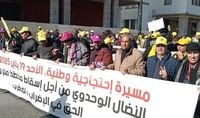As International Workers' Day approaches, labor unions across Morocco are gearing up for a significant celebration on May 1, 2025. The day, marked by demonstrations, speeches, and marches, comes at a time when the purchasing power of Moroccan citizens is under severe strain due to rising prices and high unemployment rates.
Labor organizations are mobilizing their members to advocate for better wages and improved working conditions. The National Union for Labor (UNT) has adopted a powerful slogan for this year's celebrations: "Loyalty to the historical right in housing and gains – striking the code of compulsory housing and collective ownership – collective worship for the Palestinian people and the continuation of volunteering." This reflects not only a focus on local issues but also a solidarity with global struggles.
In a similar vein, the Moroccan Democratic Federation for Labor has chosen the slogan "No concessions, no compromise on fair and legitimate rights" for this year's events. This indicates a strong commitment to defending the rights of workers amidst ongoing economic challenges.
The unions are calling on the government to implement urgent measures to protect the purchasing power of the working class. They advocate for a robust social dialogue and collective bargaining at both national and sectoral levels. Their demands include immediate actions to combat speculation and monopolistic practices that burden the average Moroccan.
One of the key points raised by the unions is the necessity for a significant increase in wages to keep pace with inflation. The UNT has highlighted the need for a general increase in salaries and pensions to help workers cope with the relentless rise in living costs.
In preparation for the celebrations, the city of Casablanca is set to host the central demonstration. Key figures, including UNT Secretary-General Mohamed Zouiten and the Secretary-General of the Justice and Development Party, Abdelilah Benkirane, will be present. They will lead a march through the city's major streets, culminating in a rally featuring speeches from union leaders.
In the capital, Rabat, another major event is planned, where Deputy Secretary-General Abdelilah Dahman will speak alongside other political figures. This gathering will also include a labor march, emphasizing the collective strength of workers across the nation.
The unions are not only focusing on wage increases but are also demanding a comprehensive review of the tax system to ensure fairness, particularly for vulnerable and middle-class citizens. They argue that the current tax burdens disproportionately affect these groups, exacerbating their financial struggles.
Moreover, the unions have raised concerns about the government's handling of food security, particularly in the meat production sector. They are calling for measures to ensure the sustainability of livestock and aquatic resources, making them accessible to all citizens at reasonable prices.
The Moroccan labor movement is also keenly aware of the historical significance of International Workers' Day. It serves as a reminder of the struggles and sacrifices made by workers in the past, particularly referencing the events in Chicago that sparked the global labor rights movement.
While unions prepare for a day of solidarity and protest, the Moroccan government has attempted to paint a more positive picture of the current economic climate. In a recent statement, the government highlighted several achievements, including the first installment of a general salary increase for public sector employees, amounting to 1,000 dirhams (approximately 100 USD) per month. This increase is part of a broader strategy to enhance public sector wages and improve social protection measures.
According to government reports, average monthly wages in the public sector are expected to rise to 10,100 dirhams (about 1,010 USD) by 2026, up from 8,237 dirhams in 2021. Additionally, the minimum wage for non-agricultural workers is set to increase by 15% to 3,046 dirhams (305 USD), with a 20% increase in the agricultural sector, bringing it to 2,255 dirhams (226 USD).
However, the unions remain skeptical of these claims, emphasizing that the measures are insufficient given the current economic hardships faced by workers. They argue that while the government touts these increases, the reality for many workers is that their wages still do not meet the rising cost of living.
As the day of demonstrations approaches, the unions are also preparing to address ongoing issues related to labor rights. They are particularly concerned about the right to strike, which they view as essential for defending workers' rights. The unions warn against any attempts to undermine this right, highlighting that it is a fundamental aspect of labor activism.
In a broader context, the Moroccan labor movement is not alone in its struggles. Similar protests and demonstrations are expected worldwide as workers unite to voice their concerns over economic inequality, job security, and labor rights.
While Morocco prepares for its own celebrations, neighboring Turkey is facing a different scenario. Authorities have imposed restrictions on Labor Day demonstrations in Taksim Square, Istanbul, citing security concerns. This has led to tensions as human rights organizations, including Amnesty International, have called for the lifting of these restrictions, arguing they violate the rights of unions to assemble freely.
As Moroccan workers ready themselves for May 1, the significance of International Workers' Day resonates deeply. It is not just a day of celebration but a vital opportunity for workers to unite, advocate for their rights, and demand the respect and dignity they deserve in the workplace.
The coming days will undoubtedly be pivotal for Moroccan labor unions as they strive to make their voices heard amidst the ongoing economic challenges. With solidarity and determination, they aim to fight for a better future for all workers in Morocco.


